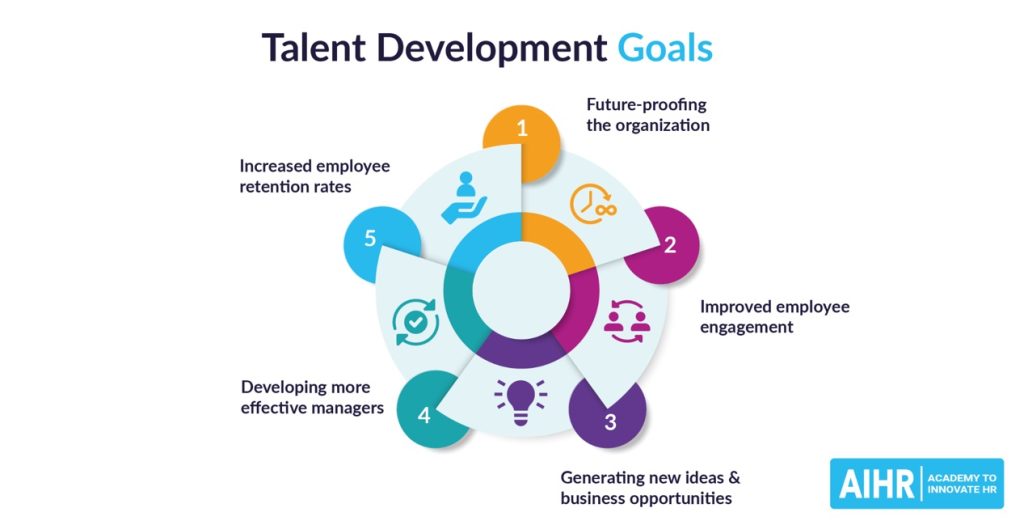Organizations that invest in talent development are setting themselves up for long-term success. Providing employees with opportunities to learn, grow and develop new skills not only benefits the individual but also the company as a whole.
Employers who prioritize talent development build strong teams, foster a culture of continuous improvement, and attract and retain top talent. Investing in employee growth and success can take many forms, from on-the-job training and mentorship programs to formal education and certification programs.
These initiatives help employees stay engaged, motivated, and committed to their work while also preparing them for future roles within the company. By investing in their people, organizations can create a workforce agility that is adaptable, innovative, and able to meet the challenges of today’s ever-changing business landscape.
Benefits Of Talent Development For Employers
Talent development is a crucial aspect of any organization’s growth strategy. It involves investing in the education and training of employees to improve their skills, knowledge, and performance.
The benefits of talent development are substantial for employers, ranging from increased productivity and employee engagement to reduced turnover rates.
One significant benefit of talent development is increased productivity. When employees receive adequate training and development opportunities, they become more proficient at their jobs and can complete tasks more efficiently. This leads to higher output levels, improved quality of work, and a more efficient workforce overall.
Another advantage of talent development is improved employee engagement. Employees who feel valued by their employers are more likely to be motivated to perform at their best. By investing in their growth and success, organizations demonstrate that they care about their employees’ career advancement goals. This can lead to increased job satisfaction and a sense of loyalty towards the company.
Finally, talent development can help reduce turnover rates. When employees feel that they are not developing professionally or do not have opportunities for career growth within an organization, they may seek employment elsewhere. However, if employers invest in developing the skills and knowledge of their employees, they are more likely to remain loyal to the company over time. This reduces recruitment costs associated with high staff turnover rates while ensuring continuity in delivery standards across teams.
In summary, talent development offers numerous benefits for employers such as increased productivity levels among workers, enhanced employee engagement leading to job satisfaction and lower staff turnover rates which results in cost savings on recruitment expenses while maintaining consistency in delivery standards across departments.
Benefits Of Talent Development For Employees
Talent development programs provide employees with numerous benefits. These programs give workers the knowledge, skills, and tools they need to succeed in their current roles and advance in their careers.
Through talent development, employees can gain a deeper understanding of their jobs’ requirements and expectations, leading to increased confidence and job satisfaction.
Moreover, talent development opportunities show employees that their employers value them and are willing to invest in their growth. This recognition can boost morale and lead to higher employee retention rates.
Additionally, when workers feel supported by their employers, they are more likely to be engaged and committed to achieving the company’s goals.
Furthermore, talent development can help employees develop new interests and passions. By exposing them to new ideas, technologies, or methodologies, talent development programs encourage workers to expand their horizons beyond their current positions.
This exposure can lead to more informed decision-making and creativity in problem-solving.
As demonstrated above, Talent Development is an investment that yields numerous benefits for employees. These programs not only provide workers with the necessary skills for career advancement but also show them that they are valued members of the team.
In turn, this creates a positive work environment that stimulates personal growth while contributing positively towards the company’s overall success.
Forms Of Talent Development Programs
As mentioned in the previous section, talent development provides numerous benefits for employees. However, it is important to explore the different forms of talent development programs that companies can offer. These programs serve as platforms for employees to enhance their skills and knowledge, ultimately leading to their personal growth and success.
One popular form of talent development program is mentorship. This involves pairing a less experienced employee with a more experienced one, who serves as a guide and role model. Through regular meetings and feedback sessions, the mentee gains valuable insights and perspectives from someone who has already navigated through the organization’s challenges.

Another common program is job rotation, where employees are given the opportunity to work on different projects or departments within the company. This expands their knowledge and skill set, allowing them to become more versatile and adaptable to changes in the workplace. It also helps them identify which areas they excel in and which ones need improvement.
To further understand the different forms of talent development programs, refer to the table below:
| Program | Description |
| — | — |
| Training programs | Formal learning sessions designed to help employees acquire new skills or improve existing ones. |
| Coaching | One-on-one sessions with a coach or expert aimed at improving specific skills or addressing certain challenges. |
| Leadership programs | Programs specifically designed for those who exhibit leadership potential or are being groomed for management positions. |
| Conferences/Workshops | Events where employees can network with industry experts, learn about new trends, and gain inspiration from keynote speakers. |
Overall, providing opportunities for talent development not only benefits individual employees but also contributes significantly to the company’s success. By investing in employee growth and success, organizations create a culture of continuous learning and improvement that fosters loyalty and engagement among its workforce.
On-The-Job Training And Mentorship Programs
As employees strive to grow and succeed in their careers, on-the-job training and mentorship programs can play a crucial role. These programs provide opportunities for employees to learn new skills, gain valuable experience, and receive guidance from experienced professionals. By investing in these types of programs, companies can not only improve employee retention rates but also enhance overall productivity.
On-the-job training programs are designed to provide employees with the hands-on experience they need to excel in their roles. This type of training can take many forms, such as job shadowing, cross-training, or apprenticeships. The goal is to give employees the opportunity to learn by doing, which can be a highly effective way of acquiring new skills. Additionally, this type of training can be more cost-effective than sending employees off-site for training sessions.
Mentorship programs are another valuable tool for talent development. These programs pair less experienced employees with more seasoned professionals who can offer guidance and support as they navigate their careers. Mentors can provide advice on everything from career goals and professional development opportunities to work-life balance and interpersonal relationships at work.
By fostering these types of relationships within the workplace, companies can create a culture of learning and growth that benefits everyone involved.
Formal Education And Certification Programs
Formal Education and Certification Programs are an excellent way to provide employees with the necessary knowledge and skills to perform their job duties better. These programs offer structured learning opportunities that can lead to increased efficiency, productivity, and job satisfaction. Formal education can also help employees stay up-to-date with industry standards and advancements, which can be beneficial for both the employee and the company.
Certification programs offer a more focused way for employees to develop specific skills that are essential for their job roles. For example, IT professionals can earn certifications in various areas such as network security, cloud computing, or data analytics. The certifications not only enhance their knowledge but also strengthen their credibility within the industry.
With certification programs being widely recognized by employers worldwide, it is a great investment for any organization looking to cultivate talent. Providing formal education and certification programs is one of the many ways companies can show their commitment towards employee growth and success. By offering these opportunities, employers create a culture of continuous learning that promotes individual development while contributing to the company’s overall growth.
Investing in employee development is critical for retaining valuable talent and staying competitive in today’s rapidly changing business environment.
Creating A Culture Of Continuous Improvement
Formal education and certification programs are excellent opportunities for employees to enhance their skills and knowledge. However, these programs are not the only way to develop talent within an organization.
Creating a culture of continuous improvement is equally important in investing in employee growth and success. A culture of continuous improvement means that the organization is committed to providing its employees with ongoing learning opportunities.
This can include on-the-job training, mentorship programs, and job rotation. By creating an environment where employees feel supported in their professional development, they are more likely to stay engaged and motivated.
Moreover, a culture of continuous improvement fosters innovation within an organization. When employees feel empowered to share their ideas and take risks, they are more likely to come up with creative solutions that can lead to business success.
In this way, investing in talent development is not only beneficial for individual employees but also for the overall growth and competitiveness of the organization.
Conclusion
In conclusion, investing in talent development is a smart move for both employers and employees.
For employers, it can lead to increased productivity, improved employee retention, and a more skilled workforce.
For employees, it provides opportunities for growth and advancement within their careers.
There are various forms of talent development programs available, from on-the-job training and mentorship programs to formal education and certification programs.
By creating a culture of continuous improvement and investing in the growth of their employees, companies can reap the benefits of a more skilled and dedicated workforce.
It’s a win-win situation for all involved.



































